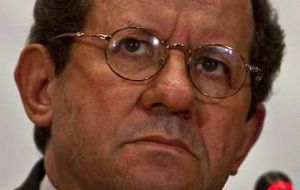MercoPress. South Atlantic News Agency
Pro-growth, pro-jobs, European Central bank next vice-president
 Portugal’s Vitor Constancio considered a “dove”
Portugal’s Vitor Constancio considered a “dove” Euro-zone finance ministers meeting Monday in Brussels nominated Portugal’s Vitor Manuel Ribeiro Constancio to become the next vice president of the European Central Bank, improving the chances of Germany’s Axel Weber to take the top job next year.
The finance chiefs from the 16 nations that use the Euro agreed that Constancio should succeed Lucas Papademos, whose eight-year term ends on May 31, said Guy Schuller, spokesman for Luxembourg’s Jean-Claude Juncker. Juncker.
Constancio’s reputation as a “dove” who pays more attention to economic growth than some of his ECB colleagues increases the likelihood that Weber, an anti-inflation “hawk,” will be chosen to replace ECB President Jean-Claude Trichet when his term ends on Oct. 31 next year. Had ministers picked Mersch, who along with Weber is seen by economists as a tough inflation fighter, the chances of Italy’s Mario Draghi replacing Trichet would have risen.
“It is difficult to see two hawks or two doves at the head of the ECB,” said Laurent Bilke, a senior economist at Nomura International Plc in London who used to work at the Frankfurt- based central bank. “The choice of vice president was always going to be a big pointer to who will succeed Trichet.”
Constancio, Portugal’s central bank chief, will assume the vice presidency of the ECB as it grapples with the fiscal crisis engulfing Greece and southern Europe. Spain and Constancio’s homeland are also under pressure to cut spending and reduce their budget deficits.
With bond yields in those countries soaring on concern they won’t be able to deliver the necessary fiscal tightening, the ECB may be forced to delay a further unwinding of the stimulus measures it put in place to deal with Europe’s worst recession since World War II.
Constancio has in the past indicated he favors policies that support growth and job creation. In November 2007, when Weber said that borrowing costs may have to rise again to damp prices, Constancio said the acceleration in inflation was “temporary” and prices were under control.
Constancio, 66, studied economics at Lisbon Technical University and was elected to parliament for the first time in 1976. He was Minister of Finance and Budget Planning in 1978 and Bank of Portugal Governor from 1985 to 1986. As leader of the Socialist Party he lost a bid to become prime minister in 1987. Constancio was reappointed central bank governor in February 2000.
Once he is installed as ECB vice president, Portugal, which has a population of 10.7 million, will have two senior European policy makers. Former Portuguese Prime Minister Jose Barroso is currently serving a second term as European Commission president.
The ECB six-member Executive Board oversees 15 departments. Papademos is currently responsible for financial stability and supervision, as well as the bank’s research unit. Trichet could choose to reshuffle the board when Constancio joins, as he did with the arrival of Germany’s Juergen Stark in 2006.




Top Comments
Disclaimer & comment rulesCommenting for this story is now closed.
If you have a Facebook account, become a fan and comment on our Facebook Page!